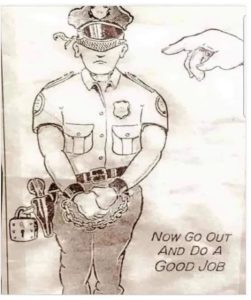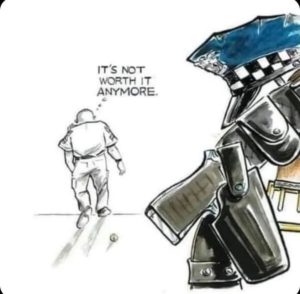Katherine Barrett and Richard Greene of Barrett and Greene, Inc. are columnists and senior advisers to Route Fifty. October 9, 2020
COMMENTARY | A new study found that as police are under more scrutiny than ever, their mental health struggles remain profound.

By Katherine Barrett & Richard Greene
The intense scrutiny and criticism focused on police this year is having a dramatic impact on officer mental health and job attitudes, an August survey of active police officers found.
The online survey is part of a study released in September that looks at the need for police mental health training and intervention. It raises alarms about both the psychological distress currently experienced by police and the implications for police departments and the communities they serve.
The movements across the country to call out and stop police brutality—as well as rethink how police do their jobs—stem from growing outrage about discriminatory police treatment of citizens, particularly Black people. They’ve been fueled by videos of police, such as the May 25 killing of George Floyd by a Minneapolis police officer who kneeled on his neck for around eight minutes.
But even as police departments and city leaders are called on to change how law enforcement officers operate or shift some duties away from police agencies, a researcher involved in the study says they also need to be thinking about the mental health of their officers.
Among the new study’s findings: The rate of depression among the 1,355 officers who answered the survey between August 2 and August 17 was five times greater than the general population, while the percentage experiencing moderate to severe anxiety was twice as high.
Those high levels of stress should provide substantial concerns for communities. Given the daily tasks performed by police officers, heightened anxiety can be a challenge when they interact with the public.
“I don’t know anyone would argue that there’s not room for improvement and reform in policing,” says Michelle Lilly, one of the co-authors of the study and an associate professor at Northern Illinois University. “However, we can’t lose sight of the fundamental need for better mental health training among law enforcement.”
One concern raised by the recent study is how police reaction to the events of 2020 affects job performance and the functioning of police departments. Survey answers revealed that 59% of officers reported that they felt “trapped or hopeless” about their jobs on a daily or weekly basis and 63% of respondents said that recent events had affected their work productivity. More than half said they were considering quitting their jobs and 69% said they would be somewhat or very unlikely to recommend a law enforcement job to someone else.
Survey results were not surprising to Lilly and her co-author, Shawn Curry, a patrol sergeant in the Peoria police department. “It’s not so much surprising as depressing,” says Curry, who began his career in law enforcement in 1996. Over the last few months, he has seen the impact of intense community antagonism on the officers he supervises. “With the riots and the public discord and the unrest, these guys were working longer hours with fewer resources,” he says. “They go to work, and they’re being demonized constantly—being called killers and Nazis. There’s so much hatred of police that over time these guys start to shut down.”
Police went from being “generally celebrated as essential workers risking their lives for the public during the first wave of Covid-19,” Lilly says, to being “targeted as brutalizers and murderers following the death of George Floyd.”
Both Curry and Lilly, a clinical psychologist, have focused for years on police mental health issues. Curry was instrumental in writing the Suicide Prevention Act for First Responders, which was signed into law in Illinois in 2019. Over the last year, they’ve been running an Illinois grant-funded program that provides free training sessions for officers across the state to deal with the mental stress of their jobs.
The threat to police officers’ sense of their own social identity has had profound effects, says Lilly. “One of the ways we develop our sense of self-esteem is through the organizations that we work with. When the organization that we’re affiliated with is perceived in such a negative way, then it can induce feelings of shame, guilt, anxiety and hopelessness.”
The survey included a screening for post-traumatic stress disorder, based on measures developed by the National Center for PTSD. It found 47% of the sample screened as positive—a rate nine times that of the population. A Ruderman Family Foundation study in 2018 also found that the incidence of PTSD in police greatly exceeded that found in the general population. At that time, however, the research showed it was as much as five times as high.
Addressing community complaints and working to reform police-community relations may ultimately relieve officer stress, as well. “As communities are able to have their concerns heard and met, it will also relieve pressure on police officers,” says Lilly.
Easing police mental health strain was one component of a consent decree in Chicago that followed a scathing 2017 Department of Justice report that called out the police department for racial discrimination and the excessive use of force. That intervention, which officially started in 2019 with a decree brokered by the state attorney general’s office, followed years of painful community-police relations and public anger after the 2014 fatal-shooting of a 17-year-old Black teenager by a white police officer who was later convicted of second-degree murder. Included among the many reform elements was expanded mental health services for police.
Awareness of police mental health issues is not new. Multiple studies over the last twenty years have found that police experience substance abuse problems that are two to three times greater than the general population. The high rate of police officer suicide—four times higher than for firefighters—has been called the number one officer safety issue by Chuck Wexler, executive director of the Police Executive Research Forum.
The volunteer nonprofit group Blue H.E.L.P., reported in early 2020 that 228 police officers died by suicide in 2019, up from 172 the year before. That compares with 48 officers who were killed “by felonious acts” in 2019 and 41 who died in accidents on the job, according to the Federal Bureau of Investigation.
In the August survey, PTSD, depression and anxiety showed up equally for police officers in suburban environments and urban ones. Veteran status did not either increase or decrease the incidence of problems, but officers with five to 10 years of service appeared to be more vulnerable than those who had been on the force for a longer or a shorter time. Ongoing shortages of police and difficulties in hiring, which we highlighted in a recent Route Fifty column, only add to increased pressure on police forces, even as budgets are being reduced.
According to Curry, in Peoria, police retirements have been skyrocketing and the department cannot fill all the officer slots that have been budgeted. “Younger guys are just walking out of the job. Who wants to go to a job every day that you’re hated?”
With departments short-staffed, pressures mount for more mandatory overtime work, potentially resulting in more stress, less time to unwind, and the danger of burnout.
While many police departments expanded mental health programs for their employees in reaction to the coronavirus, both Lilly and Curry worry the lack of time for training and the shrinking of resources will cut into mental health assistance. “I think our hope was to shed light on the events of 2020 on law enforcement mental health, so we don’t lose sight of the importance of training and intervention,” says Lilly. “We need to continue to focus on officer mental health and not lose focus on that.
Katherine Barrett and Richard Greene of Barrett and Greene, Inc. are columnists and senior advisers to Route Fifty.






